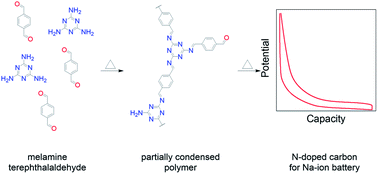Sodium storage with high plateau capacity in nitrogen doped carbon derived from melamine–terephthalaldehyde polymers†
Abstract
Sodium, one of the most widespread metals in the earth's crust, can be mined virtually everywhere and holds great promise as an electroactive material batteries to compete with commercial lithium-ion batteries in terms of price and availability. However, sodium, unlike lithium, cannot be intercalated in graphite and therefore there is a need to develop sodium anodes from alternative abundant and low-cost materials. Here we show that one-step carbonisation of melamine–terephthalaldehyde mixtures, both low-cost chemicals available on an industrial scale, yields carbons with promising properties as anodes for sodium-ion batteries. The produced materials apparently contain a large number of small pores, unreachable to gas molecules, which can store sodium (in a quasi-metallic state) as Na(0). The carbon shows plateau behaviour above and below 0 V vs. Na/Na+, with a capacity of up to 170 mA h g−1 until bulk sodium plating occurs. Additionally, for 60 cycles the carbon shows high stability, exhibiting low degradation and efficiencies close to 100%. This report is a first step towards the use of nitrogen-doped carbon materials from low-cost, industrially widespread precursors as anodes for sodium-ion batteries.



 Please wait while we load your content...
Please wait while we load your content...